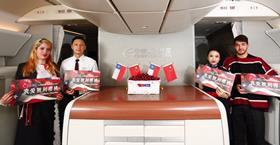
A record number of charter flights are due to land in China before the end of the month, carrying a record volume of fresh produce.
That’s according to Kurt Huang, general manager Shanghai Oheng Import & Export Co, who says chartered flights are increasingly used during Chile’s cherry and blueberry seasons before seafreight shipments arrive.
Shorter transit times and secure cold chains are just some of the benefits, with the direct flights landing in Shanghai, Zhengzhou, Hong Kong and potentially Hefei and Ningbo.
China Eastern Airways is reportedly arranging daily charter flights of Chilean cherries to China, shipping around 100 tonnes per flight, while Peru has also chartered its first direct flight to Shanghai, supplying blueberries, mangoes, asparagus and prawns on 21 November.
Zhengzhou remains the major destination for charter flights, which Huang said is due to its export potential with local manufactures shipping goods, such as mobile phones out of the capital of China’s Henan province.
While there’s likely to be a record number of charter flights into China, Huang said there's also been some challenges.
“The market was different this season compared to last, with some pre-booked charter space becoming a burden during some periods. The reasons for this could be that the [Chilean cherry] season is earlier; the volume is bigger; and the quality is not as good as last season,” Huang told Fruitnet.
“One of the reasons cherries are not selling as smoothly as last season is that online vendors are not burning money on airfreight cherries this year, which cuts off around 15-20 per cent in sales,” Huang explained, adding that due to the price of cherries this year, it's not in the interest of online vendors to pay the high costs for airfreight.
“But, even though chartered produce isn’t bringing in good sales results this season, importers will keep on doing it in the future due to the shorter transit time and secure cold chain,” Huang said.
Sea to air on the horizon
Come next year, Huang said the trade will see further changes, with China’s GeneralAdministration of Quality Supervision, Inspection and Quarantine (Aqsiq) approving sea-to-air shipments, though only for conventional charter vessels.
“This provides a balance of shipping days and costs, so next year we will see a difference in the chartered flights coming into China in December, if the protocol is renewed after the trial period,” Huang explained. “Airfreight from the US West Coast is low, and sea-to-air freight takes around 16 days, so the cost will be around one-third of the chartered freight paid now.
“But one issue to consider is that the sea-to-air route is only allowed for chartered vessels, not containers, so we will have to wait to see how this goes.”



